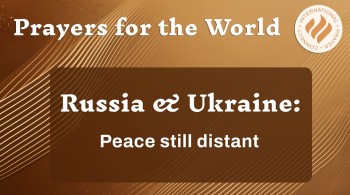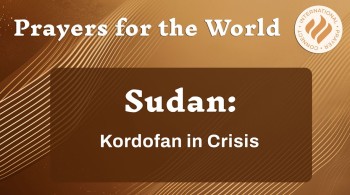
Super User
Lorem ipsum dolor sit amet, consectetur adipisicing elit, sed do eiusmod tempor incididunt ut labore et dolore magna aliqua. Ut enim ad minim veniam, quis nostrud exercitation ullamco laboris nisi ut aliquip ex ea commodo consequat. Duis aute irure dolor in reprehenderit in voluptate velit esse cillum dolore eu fugiat nulla pariatur
24/7 Prayer: Around the Throne – Around the Clock – Around the Globe
It’s our desire to see canopies of 24/7 prayer in every nation of the world by 2033 - Gods’ people praying Around the Throne, Around the Clock and Around the Globe!
One of the clearest commands to engage in continual prayer is found in 1 Thessalonians 5:16-18,
“Rejoice always, pray without ceasing, in everything give thanks; for this is the will of God in Christ Jesus for you”
It is clear that this command is to the gathered church community at Thessalonica. In the New Testament, Paul urges the entire community - not just individuals - to pray without ceasing, as this is God's will in Christ Jesus for everyone.
We pray better ‘together!’
Clearly the New Testament church was devoted to prayer. Six times, the Greek word for ‘devoted’ is used in relation to prayer; 3 patterns in the book of Acts, and 3 commands in the epistles. ‘Devoted’ meant to be diligently occupied with, to persist in, to be ‘constantly engaged in.’ These were regular, set times of prayer, like in Acts 3:1, “Now Peter and John went up together to the temple at the hour of prayer, the ninth hour.”
Acts 1:14, “All these with one accord were devoting themselves to prayer”
Acts 2:42, “And they devoted themselves to the apostles’ teaching and the fellowship, to the breaking of bread and the prayers”
Acts 6:4, “But we will devote ourselves to prayer and to the ministry of the word”
Ephesians 6:18, “Praying at all times in the Spirit, with all prayer and supplication. To that end, keep alert with all perseverance”
Romans 12:12, “Rejoice in hope, be patient in tribulation, be constant in prayer”
Colossians 4:2, “Continue steadfastly in prayer, being watchful in it with thanksgiving”
It is absolutely God’s will that we pray without ceasing, devoting ourselves to pray as a house of prayer for all nations!
What would it look like to see 24/7 prayer in your city?
 Practically speaking, what if each church in a city committed to a 24hr day of prayer once a month and then passed the baton to the next church in the city?
Practically speaking, what if each church in a city committed to a 24hr day of prayer once a month and then passed the baton to the next church in the city?
If you had 30 churches engaged in this rhythm of prayer you would see a canopy of 24/7 prayer over the city!
People could commit to convenient times and locations of prayer that fit their busy schedules. Families could commit to praying and worshipping together in their homes with their children. People could gather together in a city-wide house of prayer or prayer tower. It doesn’t matter how you organize this. It is simply the principle of churches in your city committing to regular times of prayer and worship, praying around the throne, around the clock and praying around the globe!
 One of the amazing global 24/7 prayer initiatives is called “7 Days on the Wall – A Global Call to 24/7 Prayer for Revival … among the nations!”
One of the amazing global 24/7 prayer initiatives is called “7 Days on the Wall – A Global Call to 24/7 Prayer for Revival … among the nations!”
The 7 Days on the Wall initiative was started in South Africa after the World Prayer Assembly was held in Indonesia in 2012.
Congregations sign up to pray for a week of 24/7 prayer for revival in their city and in the nations!
The next week of prayer is scheduled for August 11-17th – the focus for this week of prayer will be praying for the salvation of people in 7 unreached cities!
Will You Join Us?
As we look to the future, the call to establish canopies of prayer in every nation by 2033 is both urgent and possible - if each of us takes our place. Whether you are a pastor, a parent, a young person – a newbie to prayer or a seasoned prayer warrior - your prayers matter. Revival history tells us that sustained, united, fervent prayer is the spark that precedes the move of God.
So how do we engage practically and personally?
- Start with 1 Hour
Choose one hour a week - or a month - to pray. Invite others to join you, and simply start where you are!
“Could you not watch with Me one hour?” - Matthew 26:40
- Build a rhythm of prayer in your community.
Encourage your church or prayer group to adopt one day a month to pray. You’ll soon discover that 24/7 prayer across a city is possible!
“They all joined together constantly in prayer…” - Acts 1:14
- Pray with boldness for the nations!
As you pray around the clock, remember to pray around the globe - for revival, salvation, and kingdom transformation.
“Ask of me, and I will make the nations your inheritance…” - Psalm 2:8
We believe God is calling His Church into a lifestyle of night-and-day prayer that exalts Jesus and invites His glory. You can be part of this great movement.
Let’s do this—together, Around the Throne, Around the Clock and Around the Globe for the Global Glory of God!
Dr Jason Hubbard – Director
International Prayer Connect
A senior United Nations official has issued a grave warning about the risks of expanding military operations in Gaza, cautioning that such a move could lead to "catastrophic consequences" for millions of Palestinians and jeopardize the lives of Israeli hostages held by Hamas.
Israeli leadership reportedly considers a full reoccupation of Gaza as part of its military strategy following ongoing conflict that began in October 2023, when Hamas launched a deadly attack on southern Israel. The plan to control the entire Gaza Strip is deeply controversial within Israel and internationally, given that more than two million Palestinians live in the region.
The United Nations has repeatedly called for a ceasefire and the immediate release of hostages, emphasizing the urgent need for humanitarian aid. Conditions in Gaza have been described as "squalid" and "inhumane," with severe restrictions on food and medical supplies leading to a man-made famine. Since May, more than 1,200 Palestinians have died while trying to access essential aid, including children suffering from malnutrition.
The conflict has inflicted immense suffering on families on both sides, with tens of thousands killed and many more displaced. The path forward remains fraught with challenges as political pressures and military decisions threaten further escalation.
From a biblical perspective, this moment calls the global community to lament the loss of innocent lives and to seek God’s peace that transcends human understanding. Scripture reminds believers that God is close to the broken-hearted and calls His people to be peacemakers in times of turmoil.
As the region faces uncertainty, prayers for mercy, protection, and reconciliation are vital. The hope is that leaders will pursue paths that honour the dignity of all people and that humanitarian aid flows freely to those in desperate need.
Prayer Pointers:
- Pray: for protection and provision for the vulnerable families in Gaza facing severe shortages and violence.
- Pray: ask God to soften the hearts of leaders toward peace, justice, and the preservation of life.
- Pray: for comfort and hope for hostages and their families, and for God’s presence amid suffering.
Prayer for refuge and justice:
Father God, in the midst of chaos and sorrow, be the refuge for those who suffer. Uphold the weak, grant wisdom to the leaders, and bring peace that surpasses all understanding. Let Your justice roll like a river and mercy like an endless stream. Amen
“The Lord is righteous in all his ways and faithful in all he does. The Lord is near to all who call on him, to all who call on him in truth.” Psalm 145:17-18
Hope for an end to the war in Ukraine remains uncertain as Russian President Vladimir Putin signalled that his forces would continue advancing despite international calls for a ceasefire. Speaking from Valaam Monastery, he said negotiations with Ukraine could continue, but his conditions - Ukrainian neutrality and recognition of Russian-occupied territories - remain unchanged, conditions Kyiv sees as unacceptable.
The comments came one day after one of the deadliest Russian strikes on Kyiv in recent months. At least 31 people, including five children, were killed in a wave of missile and drone attacks. Ukrainian President Volodymyr Zelensky expressed willingness to meet with Putin “any time,” while also questioning whether Russia’s overtures reflected a sincere desire for lasting peace or simply a strategy to delay sanctions and prolong the war.
U.S. President Donald Trump has publicly expressed “disappointment” in Moscow’s refusal to cease hostilities, threatening additional sanctions if Russia does not agree to a ceasefire. Previous deadlines for ending the war have passed without impact, and Putin appeared unmoved by the latest ultimatum.
Efforts at peace have repeatedly faltered over the past two years. Talks hosted in Istanbul produced prisoner exchanges but no long-term agreement. Meanwhile, the human toll continues to rise, as relentless attacks force families into shelters and leave cities scarred by destruction. Behind the political manoeuvring and shifting ultimatums are millions of civilians longing for safety and a return to normal life.
In the face of ongoing conflict, Scripture reminds us that God is attentive to the suffering of the innocent and sovereign over the nations. While global powers weigh strategies and deadlines, His people are called to lift up both nations in prayer - for mercy, protection, and a peace that endures.
Prayer Pointers
- Pray: for civilians in Ukraine, that God would shield them from violence and provide safety, comfort, and daily provision.
- Pray: for world leaders to seek peace sincerely, acting with courage and discernment to prevent further suffering.
- Pray: and ask God to bring a just resolution to the conflict and soften hearts that are set on war.
Prayer – Prayer for the Church and those in Leadership
Lord, we lift the people of Ukraine before You. Protect the innocent, guide leaders toward true peace, and bring an end to this devastating conflict. Let Your mercy and justice prevail where human solutions fail. Amen
“He makes wars cease to the ends of the earth.” Psalm 46:9
The waters of the Sea of Japan have become the stage for growing international unease as Russia and China launched joint naval exercises this week. The “Joint Sea-2025” drills, held near Vladivostok, Russia’s largest Pacific port, feature four Chinese vessels, including two guided-missile destroyers, operating alongside Russian ships in three days of mock combat.
The exercises include submarine rescue, anti-submarine and anti-missile operations, air defence, and coordinated maritime patrols. Though both nations claim the drills target no specific country, they unfold against a backdrop of global tension. Japan has voiced concern, citing the deepening military alignment between Moscow and Beijing as a potential threat to regional security.
The timing is striking: the drills began just one day after U.S. nuclear submarines reportedly shifted closer to Russian waters, following comments by former Russian president Dmitry Medvedev that stirred fears of possible escalation. While public discussion of nuclear submarine movements is rare, these developments have drawn international attention to the growing risks in the region.
Russia and China have strengthened their strategic partnership over the past decade, holding regular joint exercises and military exchanges. Since signing a “no-limits” agreement in 2022, their cooperation has grown more coordinated, with leaders Vladimir Putin and Xi Jinping meeting over 40 times. Their partnership signals a clear intent to project influence across the Pacific.
Beneath the movements of warships and the rhetoric of governments lies a quieter reality - millions of people live in the shadow of these exercises. Each manoeuvre and show of force carries human weight, from families in Japan and Russia to communities throughout the Pacific who long for stability and peace.
Amid the uncertainty, Scripture reminds us that God reigns over the nations and the seas. While the world watches the surface of conflict, believers are called to pray for restraint, for protection, and for peace that only He can bring.
Prayer Pointers
- Pray: for restraint and wisdom among world leaders, that their decisions would pursue peace rather than conflict.
- Pray: and ask God to protect those living in regions shadowed by military tension and grant them His unshakable peace.
- Pray: that God’s sovereignty calms global fears and prevents any escalation that could cost innocent lives.
Prayer – Peace at Sea
Father, in a world of rising tension, guide leaders toward restraint and peace. Protect those living in uncertainty, calm anxious hearts, and let Your peace reign over the seas and the nations. Amen.
“He stilled the storm to a whisper; the waves of the sea were hushed.” Psalm 107:29
More: https://www.telegraph.co.uk/world-news/2025/08/03/russia-and-china-war-games-sea-of-japan-trump-nuclear/
Sudan’s oil-rich Kordofan region has become a fierce battleground as the national army and the Rapid Support Forces (RSF) vie for control. The conflict, now entering its third year, has already cost around 150,000 lives and forced more than 12 million people from their homes.
Strategically located and vital for the nation’s oil supply, Kordofan is made up of three states and home to nearly eight million people. Whoever secures the region gains not only territory but influence over Sudan’s future. Yet, amid the struggle for power, civilians face the harshest consequences.
Earlier this month, airstrikes hit West Kordofan’s capital, el-Fula, and the town of Abu Zabad, killing more than 20 people, including families sheltering in a school. The RSF has been accused of brutal attacks in North Kordofan, where more than 450 civilians, including children and pregnant women, reportedly lost their lives. Satellite images suggest some villages were deliberately burned, and many victims were trapped in their homes.
Fighting has intensified around el-Obeid, the capital of North Kordofan, as the RSF seeks to advance and the army attempts to secure supply lines. Towns such as Umm Sumaima have changed hands repeatedly, leaving residents uncertain and fearful of what comes next. Aid groups warn that each day of combat increases the toll on ordinary families who have already endured displacement, loss, and trauma.
As the battle for Kordofan stretches on, the human cost is staggering. Communities grieve, homes lie in ashes, and many live with the constant fear of violence. Yet, stories of neighbours helping one another and families clinging to hope remind us that even in the darkest valleys, light can endure.
Prayer Pointers
- Pray: for protection over Kordofan’s civilians that God would shield families from violence and deliver the oppressed.
- Pray: and ask the Lord to bring peace to Sudan for God to soften hardened hearts, ending cycles of revenge and hatred.
- Pray: for the Church in Sudan for the to remain steadfast, bringing hope and comfort to those in despair.
Prayer – for the innocent and defenceless
Lord, we lift up the people of Kordofan. Protect the innocent, comfort the grieving, and bring an end to bloodshed. Raise Your Church to shine as a beacon of hope, and let Your peace touch this broken land. Amen
“The Lord is a refuge for the oppressed, a stronghold in times of trouble." Psalm 9:9
Twenty pastors and local Christians were brutally attacked in Kotamateru village, Odisha, while holding a Christian seed-blessing ceremony. The tradition in the region calls for a ritual chicken sacrifice to bless crops, but the eleven Christian families chose a Christ-centered approach instead. Pastors from neighbouring villages were invited to bless the seeds and share fellowship.
The group received verbal assurance from police that their gathering would be safe. After completing worship, prayer, and fellowship, the pastors departed together. As they travelled past a large neem tree, villagers ambushed them with sticks, axes, spades, and knives. Ten Christians were hospitalized with serious injuries, including deep head wounds. One elderly victim, Sukra Madi, was so severely beaten that he collapsed, bleeding heavily, and now requires surgery he cannot afford.
Despite repeated calls to local authorities during the assault, the attackers ignored orders to disperse, demonstrating the Christians’ vulnerability in a remote area. The pastors did not retaliate with violence, trusting in God’s call to love and endure. This reflects the teaching of Christ, who instructed His followers to turn the other cheek and leave vengeance to Him.
After the attack, police pressured the victims into a “compromise” settlement, a tactic repeated in previous assaults on Christians in this village since 2014. The settlement has left the victims discouraged and seeking God’s intervention. Local Christian groups organized peaceful protests, drawing thousands, yet legal justice remains delayed.
The attack highlights the ongoing spiritual and physical challenges faced by believers in regions where the gospel meets opposition. Amid fear, suffering, and uncertainty, these Christians remain steadfast, praying for healing, protection, and courage to continue serving God in their communities. Their faith demonstrates the enduring power of Christ to comfort and strengthen even in the face of persecution.
This story reminds believers worldwide that following Jesus may involve suffering, but God’s presence offers peace, healing, and hope beyond immediate circumstances. Christians are called to intercede for those in danger, support fellow believers, and trust in God’s justice and providence.
Prayer Pointers
- Pray: for healing and restoration for the injured pastors that God would restore their health and strengthen their faith.
- Pray: for protection and courage for Christians facing hostility for them to trust God to shield them from harm and fear.
- Pray: for God’s justice and peace that authorities will act rightly and victims find hope in His timing.
Prayer – For the church in Odisha
Lord, protect and heal Your children who suffer for Your name. Strengthen their hearts, grant peace, and bring justice according to Your will. May Your presence comfort them and renew hope amidst trials. Amen.
"The Lord is my refuge and my fortress, my God, in whom I trust." Psalm 91:2
More: https://christiannews.net/2025/07/29/pastors-and-other-christians-brutalized-in-odisha-state-india/
In Uzbekistan, where Christians make up less than 0.3% of the population, a quiet revival is taking shape. Along the ancient Silk Road city of Bukhara, once a hub of Islamic scholarship, house churches are emerging, led by young believers unashamed to follow Jesus.
Recent reforms under President Shavkat Mirziyoyev have introduced a measure of religious openness, making it possible for churches to register and for Christians to gather with less fear. This shift is providing fertile soil for the Gospel, as more people encounter Christ in deeply personal ways.
Mission Eurasia’s School Without Walls is helping to fuel this movement. Rather than traditional classrooms, it’s a network of discipleship, training young believers in evangelism, family life, and practical Christian living. These leaders gather in homes, share meals, and testify of Christ’s work in their lives. Music, hospitality, and shared tea often open the first door to the Gospel for their Muslim neighbours.
Stories of miraculous encounters with Jesus are spreading. Many Muslims report dreams where they see Christ, His pierced hands extended in invitation. Physical healings are also drawing hearts to faith, as believers pray boldly for the sick and witness God’s power.
In mountain villages, believers trek miles over rough terrain to worship in small, multi-ethnic gatherings of Uzbeks, Tajiks, Kazakhs, Russians, and South Koreans, a living picture of the global Body of Christ. Slowly but steadily, the Gospel is advancing along the Silk Road, once known for trade and scholarship, now becoming a path for spiritual renewal.
The rise of the church in Uzbekistan is a quiet yet profound testimony - in a land long marked by Islamic tradition and Soviet repression, the light of Christ cannot be hidden.
Prayer Pointers
- Pray: for boldness among new believers. Ask God to strengthen young Christians in Uzbekistan to share the Gospel courageously, even when facing misunderstanding, opposition, or rejection.
- Pray: for dreams and visions of Jesus. Ask the Holy Spirit to reveal Jesus through dreams and visions, especially to Muslims seeking truth, leading many into salvation and discipleship
- Pray: or spiritual growth and discipleship. Pray for godly mentors and biblical teaching to help new believers mature in Christ and rise as courageous leaders in their communities.
Prayer – For the Rising church
Lord Jesus, bless the rising church in Uzbekistan. Strengthen young believers with courage and wisdom. Open more hearts through dreams, healings, and hospitality. Protect house churches and let Your light spread along the ancient Silk Road, drawing many to salvation.
"After they prayed, the place where they were meeting was shaken. And they were all filled with the Holy Spirit and spoke the word of God boldly." Acts 4:31
More: https://cbn.com/video/shows/christian-world-news-church-growing-islamic-stronghold-august-1
Under the fading light of a Roman sunset, the sprawling space of Tor Vergata filled with hundreds of thousands of young pilgrims. They gathered for the Jubilee of Youth’s pre-vigil, an evening rich with prayer, music, and testimonies—voices from many nations and languages joining together in hope and faith.
Among this vast crowd were three young believers whose stories of rediscovery and transformation offered a glimpse of God’s quiet, powerful work in human hearts.
Antoine Saint-Claire, 18, from France, grew up in a faithful Christian family where Mass and sacraments were familiar, though his faith felt routine. Watching peers who prayed with passion and intimacy stirred a yearning within him. On a pilgrimage to Lourdes, during a moment of adoration before the Eucharist, he experienced a profound encounter with Christ’s love. “I now know I am loved,” Antoine shared, “and I want to love in return with all I am.”
Gustavo Eterno, from Brazil’s Shalom Catholic Community, recounted a journey from emptiness to renewed joy. Music, once a personal refuge, lost its meaning as he drifted away from God, leaving him disoriented. Then, in Eucharistic adoration, he found the love he had been seeking. Now a seminarian, Gustavo dedicates his life to praising the Lord and guiding others toward that same joy.
 Olimpia Iacono, a young Italian physician, described how her vocation deepened beyond her medical calling. A mission trip to Argentina and her care for a terminally ill patient revealed the universal Christian call to love. In the patient’s hospital room, she witnessed suffering transformed into grace, demonstrating how simple acts of compassion reflect God’s love.
Olimpia Iacono, a young Italian physician, described how her vocation deepened beyond her medical calling. A mission trip to Argentina and her care for a terminally ill patient revealed the universal Christian call to love. In the patient’s hospital room, she witnessed suffering transformed into grace, demonstrating how simple acts of compassion reflect God’s love.
Though different in culture and experience, these stories converge in a shared truth: when hearts open to God, routine transforms into encounter, sorrow becomes song, and love flows outward, touching a world in need of hope.
Their testimonies remind us that faith is not a distant ideal but a living reality of God’s love stirring in everyday lives, calling each person to respond. In a world often marked by uncertainty, their hope shines as a quiet but persistent light.
See the Festival of Unity and Hope livestream here
Prayer Pointers:
- Pray: for young believers to personally encounter Christ and live boldly in their faith amid today’s challenges.
- Pray: and ask God to use music, testimonies, and acts of love to draw many into His presence and joy.
- Pray: that Christ’s love overflows through simple acts of kindness, bringing hope and healing to hurting hearts.
Prayer for the Pilgrims of Hope
Lord God, thank You for awakening faith in young hearts. Let their lives radiate Your love, comfort the broken, and inspire a world in need of hope. Draw many to know and follow You through their witness. Amen
“You will seek me and find me when you seek me with all your heart.” — Jeremiah 29:13
More: https://www.vaticannews.va/en/vatican-city/news/2025-08/pre-vigil-jubilee-youth-testimonies-young-pilgrims-tor-vergata.html
Join Us for 15 Days of Prayer for the Hindu World (12–26 October 2025)
“Declare His glory among the nations, His wonders among all peoples.” (Psalm 96:3)
We warmly invite you, your family, and your church to join International Prayer Connect for 15 Days of Prayer for the Hindu World, from 12–26 October 2025. Together, let’s stand in prayer for over 1.2 billion Hindus, many of whom have never heard the Good News of Jesus Christ.
This special prayer initiative surrounds Diwali, the Hindu “Festival of Lights”- a time when hearts are open to spiritual conversations and new beginnings. As Hindus celebrate light triumphing over darkness, we believe this is a prophetic moment to pray that many will discover Jesus, the true Light of the World (John 8:12).
We’re excited to announce that adult and children’s prayer guides have been prepared in over 30 languages and are available at 110cities.com. These guides feature powerful testimonies - like miraculous healings that led entire villages to Christ - alongside fascinating facts, cultural insights, and profiles of cities where significant unreached Hindu people groups live. Each day offers focused prayer points and links for further exploration.
This journey culminates on 20th October with a Global Day of Prayer, uniting believers worldwide to intercede for breakthrough among Hindu communities.
“Ask of Me, and I will give You the nations for Your inheritance.” (Psalm 2:8)
Whether you’re a church leader, a family, a youth group, or an individual intercessor, your prayers can open spiritual doors and transform destinies.
Let’s raise our voices together so that every Hindu person may one day hear and respond to the hope found in Jesus Christ.
Join us - and let’s pray for the Hindu world!
More info: https://110cities.com/hinduism/
August 19, 2025
Starts: 00:00 EST | 06:00 CEST | 12:00HRS SGT
Shine! is a 24-hour global celebration of Jesus, hosted by children, families, churches and ministries across every continent. We’re lifting up the name of Jesus and praying for the success of the upcoming “Light of the World” movie – a powerful Gospel film being translated into hundreds of languages.
Light of the World is a beautifully hand-drawn animated film that follows Jesus’ life through the eyes of young John, powerfully sharing the Gospel message of love, hope, and salvation with children and families worldwide.
During Shine!, we’ll be praying for children to know Jesus, boldly share His love, and for the Light of the World movie to impact families and nations with the Gospel. Watch the Trailer!
Continuous online Zoom sessions and offline local gatherings will blend worship, intercession, creativity and child-led passion. Children will pray boldly, worship joyfully, and share Jesus faithfully!
"Don’t let anyone look down on you because you are young..." – 1 Timothy 4:12
You can join an hour online or lead your own gathering at home or church using our free Shine! Small Group Pack. Let’s raise a wave of worship and intercession that covers the earth - through the voices of the next generation!
More info, Resources and Sign-up
www.2bc.world/shine









